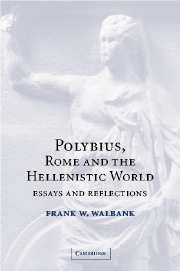Book contents
- Frontmatter
- Contents
- Preface
- Acknowledgements
- List of abbreviations
- 1 Polybian studies, c. 1975–2000
- HISTORICAL AND GEOGRAPHICAL PAPERS
- 2 The geography of Polybius
- 3 Egypt in Polybius
- 4 The surrender of the Egyptian rebels in the Nile delta (Polyb. xxii.17.1–7)
- 5 Two Hellenistic processions: a matter of self-definition
- 6 Polybius and Macedonia
- 7 Sea-power and the Antigonids
- 8 H TΩN OΛΩN EΛΠΙΣ and the Antigonids
- 9 Hellenes and Achaeans: ‘Greek nationality’ revisited
- 10 The Achaean assemblies
- POLYBIUS AS A HISTORIAN
- POLYBIUS ON ROME
- TRANSMISSION OF POLYBIUS
- Bibliography
- Indexes
3 - Egypt in Polybius
Published online by Cambridge University Press: 22 September 2009
- Frontmatter
- Contents
- Preface
- Acknowledgements
- List of abbreviations
- 1 Polybian studies, c. 1975–2000
- HISTORICAL AND GEOGRAPHICAL PAPERS
- 2 The geography of Polybius
- 3 Egypt in Polybius
- 4 The surrender of the Egyptian rebels in the Nile delta (Polyb. xxii.17.1–7)
- 5 Two Hellenistic processions: a matter of self-definition
- 6 Polybius and Macedonia
- 7 Sea-power and the Antigonids
- 8 H TΩN OΛΩN EΛΠΙΣ and the Antigonids
- 9 Hellenes and Achaeans: ‘Greek nationality’ revisited
- 10 The Achaean assemblies
- POLYBIUS AS A HISTORIAN
- POLYBIUS ON ROME
- TRANSMISSION OF POLYBIUS
- Bibliography
- Indexes
Summary
Despite a growing number of ostraca and papyri much of the history of Ptolemaic Egypt still rests largely on the text of Polybius. I hope therefore that my friend and colleague, Herbert Fairman, will accept as a suitable tribute to his achievements in the field of Ptolemaic language and culture, and to the generosity with which he invariably makes his scholarship available to all who approach him, some observations on the merits of what Polybius has to say about Ptolemaic Egypt and on the rôle which he assigned to that kingdom in his account of the rise of Rome to world power. Polybius is especially concerned with the reigns of four Ptolemies – Philopator, Epiphanes, Philometor and Euergetes II. Since he was born towards the end of the third century he had to depend for his account of Philopator mainly on previous writers, whereas to some extent for Epiphanes and even more for the other two he was a contemporary and could command direct sources of information. Unfortunately our text of Polybius is incomplete. From the books covering events after Raphia, 217 bc, we possess only fragments; consequently we are at the mercy of Polybius' excerptors and can be brought to a halt in mid-stream whenever their interest flags. Also, a more grievous loss, only six out of the fifty-three titles of excerpts assembled on the orders of Constantine Porphyrogenitus have survived.
- Type
- Chapter
- Information
- Polybius, Rome and the Hellenistic WorldEssays and Reflections, pp. 53 - 69Publisher: Cambridge University PressPrint publication year: 2002



